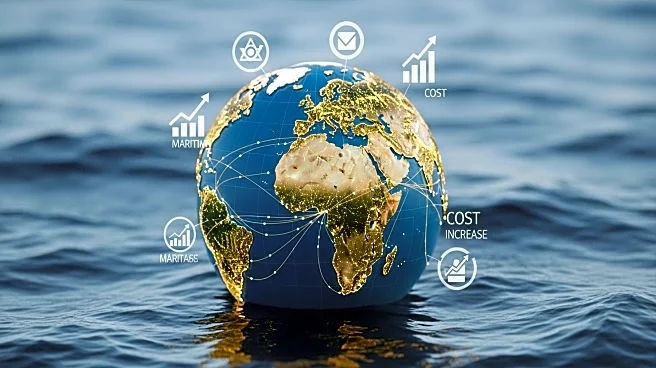What is the story about?
What's Happening?
The United Nations Conference on Trade and Development (UNCTAD) has released a report indicating that global maritime trade is entering a period of fragile growth and rising costs. After years of strong growth, seaborne trade volumes increased by only 2.2% in 2024 and are expected to slow further to 0.5% in 2025. Geopolitical tensions, new trade barriers, and climate pressures are reshaping shipping routes, increasing costs, and exposing vulnerabilities in the global economy. Smaller and less developed countries, particularly those that are net importers of food, are most at risk due to higher freight costs leading to more expensive imports and food insecurity.
Why It's Important?
The slowdown in maritime trade growth and rising costs have significant implications for global economic stability, particularly for developing countries that rely heavily on imports. Higher transport costs can exacerbate food insecurity and economic challenges in these regions. The report highlights the need for investments in sustainability, digitalization, and stable trade policies to mitigate these risks. The shipping industry's greenhouse gas emissions and the need for fleet renewals and new fuel infrastructure are critical issues that require attention to ensure resilience and sustainability in maritime transport.
What's Next?
UNCTAD calls for urgent investments in shipping and port infrastructure, digitalization, and cybersecurity to address the challenges facing global maritime trade. Clear regulatory signals are needed to support fleet renewals and the transition to alternative fuels. Support for vulnerable economies will be crucial to help them cope with higher costs and environmental challenges. The report emphasizes the importance of stable trade policies to restore confidence in supply chains and reduce uncertainties.
Beyond the Headlines
The report underscores the ethical and environmental dimensions of maritime trade, highlighting the need for sustainable practices and equitable support for developing countries. The transition to net-zero strategies and the digitalization of shipping are long-term shifts that could reshape the industry, influencing global trade patterns and economic development.















